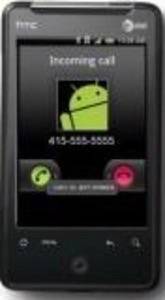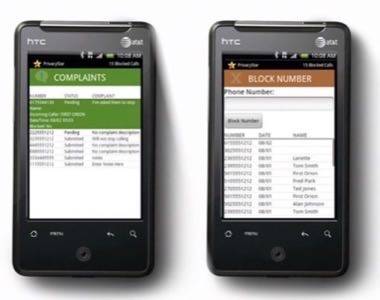First Orion, maker of a popular call-blocking and caller identification app for BlackBerry smartphones, is today revealing a new Android application which promises similar features. The app called PrivacyStar lets Android users block calls, report violators of the Do Not Call law and utilize the real Caller ID services.

Although there are a number of Caller ID-type applications already out there for mobile phones, PrivacyStar actually connects with the SS7 Network. In the telephony world, this set of signaling protocols allows for the existence of services like call forwarding, call waiting, call screening, busy callback, caller identification and more.
However, PrivacyStar’s claim that this SS7 connectivity for True Caller ID makes the app an “industry first” appears to be a bit of hyperbole. Competitor Privus Mobile, for example, can also connect with SS7 via its set mobile Caller ID applications. As explained in this forum posting (from 2008!), PrivusMobile’s CTO says the company accesses data via its parent company, Accudata Technologies. “They have a patented system to translate our requests into a query to all the telecom databases in North America. This includes Verizon, VeriSign, AT&T, and many others… So the query starts on the data network and might go out over the SS7 signaling network, or might go over another data network to get whatever will be the most current information for the calling phone number.”
Being directly connected to SS7 or not may or may not be a key selling point for PrivacyStar’s end users.

PrivacyStar: Caller ID, Blacklisting and More
That said, First Orion claims PrivacyStar’s implementation of Caller ID is the one most similar to Caller ID services you would find on your landline phone. As with traditional Caller ID, the new app will display the name and number of whoever’s calling as the phone rings. In the past, this service was only available to former PrivacyStar users by way of a lookup tool integrated with the phone’s call log feature. Now, the identification is immediate.
In addition to the caller identification service, PrivacyStar users can also block individual phone numbers, entire area codes or private and unknown numbers. An included (and optional) SmartBlock service goes even further, proactively blocking phone numbers identified and blocked the most by all PrivacyStar users. If a telemarketer makes their way through somehow, despite this formidable blockade, you can then report them as being in violation of the Do Not Call list, assuming you’ve added your number.
Finally, a Do Not Disturb feature not only sends calls straight to voicemail, but also sends out a customized text message to the caller saying you’ve received the message. The recipient could then text back if the message was urgent but you weren’t able to talk. (Would it be wrong to turn this on permanently, we wonder?)
Droid Doesn’t?
There is one unfortunate drawback to the $2.99/month PrivacyStar service subscription: It doesn’t work over Verizon’s CDMA network. The company explains that on the CDMA network, the Caller ID service isn’t able to make an outbound call while a voice channel is operating. For CDMA users, PrivacyStar’s caller identification feature will only work when the phone is also connected to a Wi-Fi network.
These afflicted users can rely on the reverse caller lookup option instead, which allows any user to find the name of the caller within their call log. This option is similar to the current way the BlackBerry app works, but the BlackBerry version will soon be updated with the features outlined here today.
Why There’s No iPhone App
Interestingly enough, one app that’s not mentioned as being in development is the Apple iPhone version of PrivacyStar. Why is that?
From what we could gather, it’s primarily because Apple doesn’t allow the level of modifications required by PrivacyStar within its officially sanctioned iPhone applications. For example, PrivacyStar changes the incoming call screen. Would Apple allow that? No. Nor would it allow an app that integrates deeply with call logs and contact lists.
Apple’s restrictions give Android and even Blackberry the edge here when it comes to offering practical tools for the everyday user. iPhone owners who want similar functionality can download “lookup apps” that let you enter in phone numbers after the fact, or apps that apply custom ringtones to warn you of “blacklisted” numbers. To really blacklist a number, iPhone owners have to jailbreak their phones, then install apps like iBlacklist. And to get Caller ID services… wait, what’s that?…There isn’t even a jailbreak app delivering Caller ID functionality to iPhone? Sorry, guys.

















